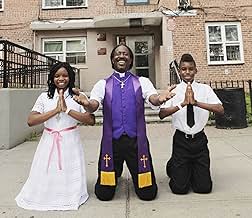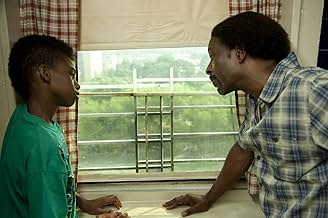Ajouter une intrigue dans votre langueA middle-class boy from Atlanta finds his worldview changed as he spends the summer with his deeply religious grandfather in the housing projects of Red Hook, Brooklyn.A middle-class boy from Atlanta finds his worldview changed as he spends the summer with his deeply religious grandfather in the housing projects of Red Hook, Brooklyn.A middle-class boy from Atlanta finds his worldview changed as he spends the summer with his deeply religious grandfather in the housing projects of Red Hook, Brooklyn.
- Récompenses
- 4 nominations au total
Jon Batiste
- Da Organist Tk Hazelton
- (as Jonathan Batiste)
Histoire
Le saviez-vous
- AnecdotesThis is the sixth film in Spike Lee's series "Brooklyn Chronicles."
- ConnexionsReferenced in Da Sweet Blood of Jesus (2014)
Commentaire à la une
Spike Lee's Red Hook Summer is a picture on par with his first major release, Do the Right Thing, from 1989, which rewarded him with mainstream attention and acclaim from critics and audiences who felt like they were punched in the face with the fist of raw honesty. Throughout his career, Lee has been dedicated to making films with black characters who collectively evade shallow stereotyping and on-set racism, but ones with true humanity and emotions seemingly bleeding from their cold, unhinged bodies.
If you haven't been properly acquainted with one film by Lee, Red Hook Summer is an efficient place to start, but one should wisely begin the adventure at Do the Right Thing, where his true vision and aptitude for writing and directing come into play. This is the closest thing we'll get to a sequel to that masterpiece and I'll take it with no quibbles. If anything. this is a return to form for Lee, who for years was centered on urban dramas with specific characters and a specific agenda. With this picture, he allows the capabilities and the talents of his actors, young and old, to grab the material and freely run with it, creating a fulfilling, spontaneous atmosphere showing not listlessness but an agenda determined to hit on several emotions and character studies. It may be a tad uneven, but it's a film that is so pleasantly written, wonderfully acted, and expertly placed and choreographed that one forgives these flaws and doesn't really notice them long after.
The story is slender, focusing on a young teenager named Flik, wonderfully portrayed by first-timer Jules Brown, who is forced to spend the summer with his grandfather named Enoch Rouse (Clarke Peters), a renowned bishop at the local church in Brooklyn, famous for his fiery sermons and eventful lectures on the word of God and Jesus. Coming from Atlanta, Flik is a kid who took a lot of his privileges for granted, mostly his private school which raised him better than many others he surrounds himself with in Brooklyn, his friends, his relationships, and his iPad 2, which he flashes around like a kid with a McDonald's happy meal toy. Going to Brooklyn with the limited street knowledge he possesses, he is in for a rude awakening but also a faithful (no pun intended) learning experience.
Flik soon learns that living with his grandfather will require a change from his strictly vegan diet, a change in work ethic, and most importantly, a change in the way he views spirituality. Flik is forced to attend his grandfather's sermons, whether he agrees with them or not, but soon realizes that him and the popular New York gang "the Bloods" are the only ones who reject religious beliefs when a church sits practically right next to their housing district.
Just a forewarning; this is not a story of a boy's discovery of the importance of faith and spirituality, but how one boy deals with the dependence on faith and spirituality in the world around him. How he deals with an abrupt change in ethics when forced to live with his grandfather who just found out he exists. And how he begins to respect and admire walking on the different side of the road; something I've preached about since the beginning of my odyssey reviewing films. What Flik is going through as a character is being exposed to a different lifestyle he was willfully ignorant of. He was confined to his small, spoonfed culture in Atlanta, Georgia, and I can't blame his inherent lack of tolerance towards another way of life. What matters is he goes on to accept it and perhaps even admire it.
Flik too befriends a young girl named Chazz Morningstar (Toni Lysaith), an openly feisty woman who questions faith just like her newfound best friend, but seemingly follows it with very loose direction and or guidance. Her homelife is rough, like many youths in the public housing district, her morals jumbled, and her outlook grim and shallow.
There is a twist in the picture, which the film has sort of become infamous for, as it is introduced abruptly and without a clear purpose. This seems to happen with spontaneous films, and being that Lee appears to have thrown a chockablock of ideas into a huge pot to see what works and what doesn't, it's understandably so that one thing doesn't flow well or fails to remain consistent with the remainder of the picture. The shocking thing is how there's only really one uneven element in the entire two hour excursion.
Just like Lee's debut Do the Right Thing, the film has the bright, vibrant, and luscious cinematography, with eye-popping primary colors, and a seamy, humidity-soaked atmosphere relevant to Brooklyn's summer climate. Mix this in with a plethora of great performances (the highlight being Clarke Peters' multi-layered bishop), a finely tuned script, sensitive and alert direction, and a fantastic score, and you have the work of under-appreciated perfection that is Red Hook Summer. Now stir.
NOTE: Spike Lee's character Mookie, the aimless pizza man from Do the Right Thing, makes a few brief cameo appearances, sure to churn a well-warranted smile from someone who appreciates "Spike Lee joints" and cross-film references.
Starring: Clarke Peters, Jules Brown, and Toni Lysaith. Directed by: Spike Lee.
If you haven't been properly acquainted with one film by Lee, Red Hook Summer is an efficient place to start, but one should wisely begin the adventure at Do the Right Thing, where his true vision and aptitude for writing and directing come into play. This is the closest thing we'll get to a sequel to that masterpiece and I'll take it with no quibbles. If anything. this is a return to form for Lee, who for years was centered on urban dramas with specific characters and a specific agenda. With this picture, he allows the capabilities and the talents of his actors, young and old, to grab the material and freely run with it, creating a fulfilling, spontaneous atmosphere showing not listlessness but an agenda determined to hit on several emotions and character studies. It may be a tad uneven, but it's a film that is so pleasantly written, wonderfully acted, and expertly placed and choreographed that one forgives these flaws and doesn't really notice them long after.
The story is slender, focusing on a young teenager named Flik, wonderfully portrayed by first-timer Jules Brown, who is forced to spend the summer with his grandfather named Enoch Rouse (Clarke Peters), a renowned bishop at the local church in Brooklyn, famous for his fiery sermons and eventful lectures on the word of God and Jesus. Coming from Atlanta, Flik is a kid who took a lot of his privileges for granted, mostly his private school which raised him better than many others he surrounds himself with in Brooklyn, his friends, his relationships, and his iPad 2, which he flashes around like a kid with a McDonald's happy meal toy. Going to Brooklyn with the limited street knowledge he possesses, he is in for a rude awakening but also a faithful (no pun intended) learning experience.
Flik soon learns that living with his grandfather will require a change from his strictly vegan diet, a change in work ethic, and most importantly, a change in the way he views spirituality. Flik is forced to attend his grandfather's sermons, whether he agrees with them or not, but soon realizes that him and the popular New York gang "the Bloods" are the only ones who reject religious beliefs when a church sits practically right next to their housing district.
Just a forewarning; this is not a story of a boy's discovery of the importance of faith and spirituality, but how one boy deals with the dependence on faith and spirituality in the world around him. How he deals with an abrupt change in ethics when forced to live with his grandfather who just found out he exists. And how he begins to respect and admire walking on the different side of the road; something I've preached about since the beginning of my odyssey reviewing films. What Flik is going through as a character is being exposed to a different lifestyle he was willfully ignorant of. He was confined to his small, spoonfed culture in Atlanta, Georgia, and I can't blame his inherent lack of tolerance towards another way of life. What matters is he goes on to accept it and perhaps even admire it.
Flik too befriends a young girl named Chazz Morningstar (Toni Lysaith), an openly feisty woman who questions faith just like her newfound best friend, but seemingly follows it with very loose direction and or guidance. Her homelife is rough, like many youths in the public housing district, her morals jumbled, and her outlook grim and shallow.
There is a twist in the picture, which the film has sort of become infamous for, as it is introduced abruptly and without a clear purpose. This seems to happen with spontaneous films, and being that Lee appears to have thrown a chockablock of ideas into a huge pot to see what works and what doesn't, it's understandably so that one thing doesn't flow well or fails to remain consistent with the remainder of the picture. The shocking thing is how there's only really one uneven element in the entire two hour excursion.
Just like Lee's debut Do the Right Thing, the film has the bright, vibrant, and luscious cinematography, with eye-popping primary colors, and a seamy, humidity-soaked atmosphere relevant to Brooklyn's summer climate. Mix this in with a plethora of great performances (the highlight being Clarke Peters' multi-layered bishop), a finely tuned script, sensitive and alert direction, and a fantastic score, and you have the work of under-appreciated perfection that is Red Hook Summer. Now stir.
NOTE: Spike Lee's character Mookie, the aimless pizza man from Do the Right Thing, makes a few brief cameo appearances, sure to churn a well-warranted smile from someone who appreciates "Spike Lee joints" and cross-film references.
Starring: Clarke Peters, Jules Brown, and Toni Lysaith. Directed by: Spike Lee.
- StevePulaski
- 12 nov. 2012
- Permalien
Meilleurs choix
Connectez-vous pour évaluer et suivre la liste de favoris afin de recevoir des recommandations personnalisées
- How long is Red Hook Summer?Alimenté par Alexa
Détails
Box-office
- Montant brut aux États-Unis et au Canada
- 338 803 $US
- Week-end de sortie aux États-Unis et au Canada
- 40 070 $US
- 12 août 2012
- Montant brut mondial
- 338 803 $US
- Durée2 heures 1 minute
- Couleur
- Mixage
- Rapport de forme
- 1.85 : 1
Contribuer à cette page
Suggérer une modification ou ajouter du contenu manquant

Lacune principale
By what name was Red Hook Summer (2012) officially released in Canada in English?
Répondre





























